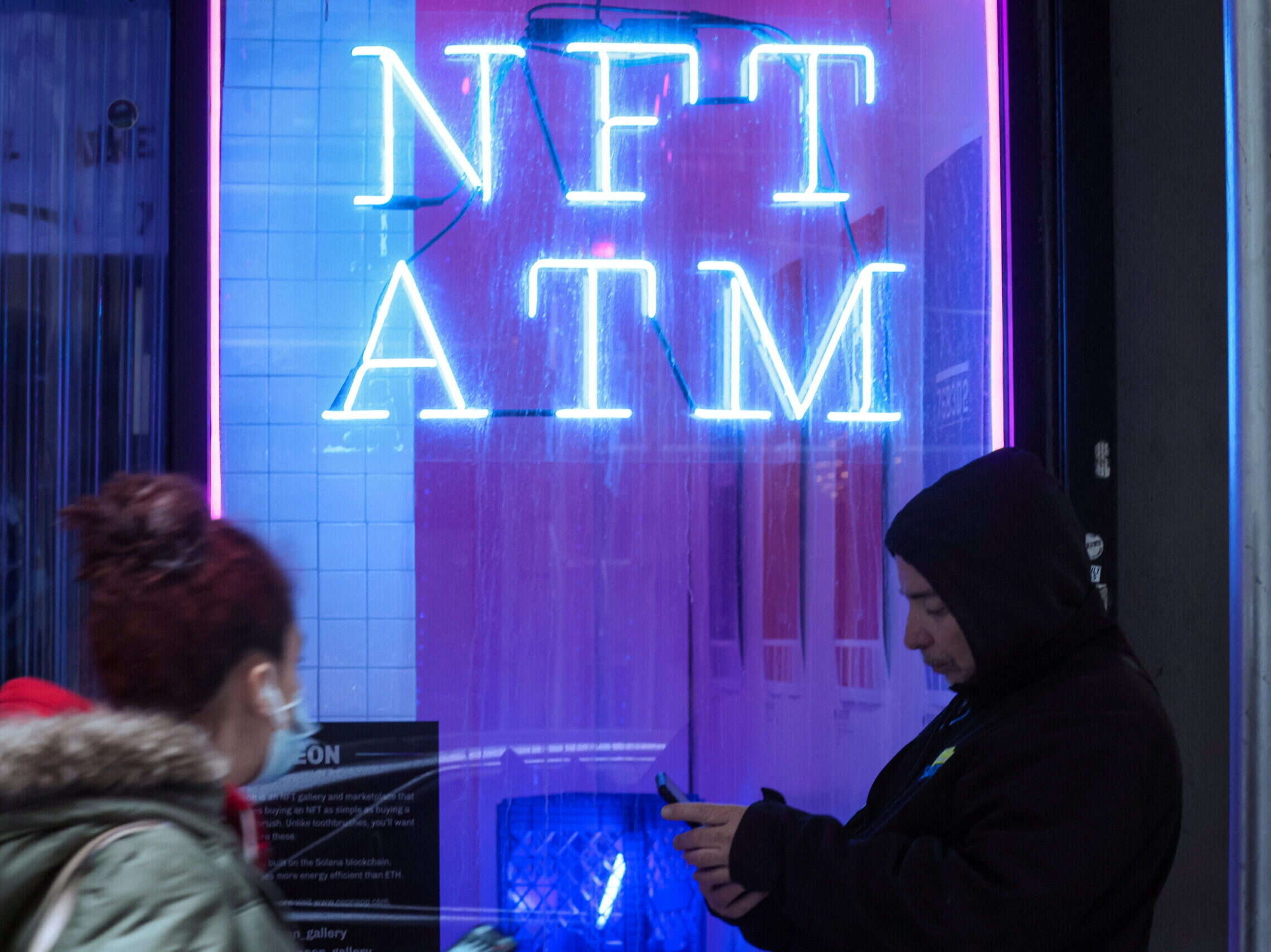
News publishers analysed by Press Gazette have sold nearly $12m (£9m) worth of non-fungible tokens (NFTs) since March 2021.
One publisher accounts for the overwhelming majority of that figure.
The chief executive at another is leaving his well-known publication to spin off its newborn NFT initiative.
And around $1.4m (£1.1m) has been raised for charity by three of the publishers collectively.
But at another organisation, unlucky NFT buyers have been left worrying that they have had the rug pulled out from under them, with no way to sell on their expensive digital acquisitions.
Below, Press Gazette has taken a look at how news publishers sought to capitalise on the NFT craze.
Quick guide: blockchain, NFTs and web3
An NFT is a certificate of ownership associated with a digital object, for example a picture or a video. NFTs differ from conventional certificates because, like cryptocurrencies such as Bitcoin, their ownership is recorded in a blockchain – a public, digital ledger that is effectively impossible to forge or manipulate.
The proliferation of technologies based on blockchains has prompted some tech evangelists to pronounce the coming of “web3”: an envisioned next evolution of the internet underpinned by the transparent ledgers.
NFTs are typically purchased using cryptocurrencies, in particular Ethereum, the second-largest by market capitalisation. Cryptocurrency exchange prices are extremely volatile: dollar and sterling figures below represent contemporary conversions when the NFTs were sold. The figures also do not take into account any service fees charged by NFT platforms to the publications.
(*Publishers marked with an asterisk donated the funds raised by their NFT sales to charity.)
Time: >$10m (£7.5m)
Time has earned the most from web3 initiatives out of all the publishers surveyed by Press Gazette.
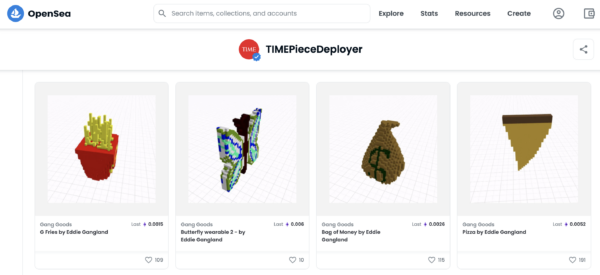
Time’s marketplace on Opensea. Picture: Opensea screenshot
In common with the other organisations assessed, the American magazine publisher has not published exact figures on how much it has earned from NFTs.
However, the company said in January that in the prior nine months it had done “in excess of eight-figures of revenue” specifically from web3 ventures. As a result of its successes it shifted its president, Keith Grossman, off his previous duties and specifically onto leading the company’s web3 efforts.
The company’s use of NFTs began with an auction in March 2021 of three tokens of front covers, two of them historical and one mocked up specifically for the occasion. AdWeek reported that that first foray netted the company the then-equivalent of $435,000 in the cryptocurrency Ethereum.
The publisher has since established a storefront for Time-branded NFTs on token marketplace website Opensea. Few of the newer NFTs on sale are explicitly linked to Time’s journalism or past work.
The Opensea storefront appears to have been the source for much of Time’s NFT wealth: Press Gazette reported in January that a Discord channel tracking Time’s NFT sales recorded 100 sales in four days, collectively costing £70,000 worth of Ethereum. (Since Press Gazette’s January report, Time has removed the Discord feed.)
It is unclear what proportion of each sale Time takes for itself. Most “Timepieces”, as the company calls its NFTs, are associated with works created by independent artists, and atop any proceeds that go to them Opensea takes a 2.5% cut of any transactions on its platform.
The New York Times*: $560,000 (£430,000)
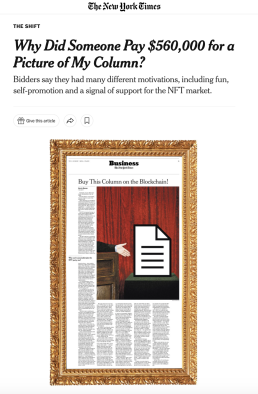
NYT columnist Kevin Roose muses in one column on the sale of another as an NFT. Picture: New York Times website screenshot
The New York Times’ technology columnist Kevin Roose auctioned an NFT of one of his own columns - titled “Buy This Column on the Blockchain!” - in March 2021. Despite setting the minimum price at 0.5 Ethereum, the contemporary equivalent of $800 (£600), the price rocketed up to 350 Ethereum - approximately $560,000 (£430,000).
The Verge noted the money was “enough to buy two millennia’s worth of NYT digital subscriptions”. Nonetheless, the proceeds were donated to The New York Times’ Neediest Cases Fund.
The Economist*: $422,000 (£305,000)
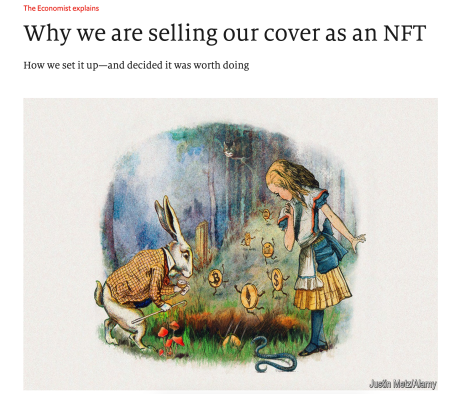
The Economist's article explaining its decision to auction an NFT of its cover. Picture: The Economist website
In October The Economist sold an NFT of a cover that ran the previous month which illustrated decentralised finance with an image of Alice in Wonderland. It sold for 99.9 Ethereum, the contemporary equivalent of $420,000 (£305,000).
The Economist will receive 10% of any future sales of the work.
It donated the proceeds to The Economist Educational Foundation, “an independent charity that teaches young people to analyse current affairs”.
Forbes*: ~$408,000 (£310,000)
Forbes claims to have been the first publisher to have turned a cover into an NFT, auctioning off a "Merchants of the Metaverse" token depicting the entrepreneur Winklevoss twins for $333,333 in April 2021.
Those proceeds were donated to the Committee to Protect Journalists and the International Women’s Media Foundation. The publisher has since returned to the field with a for-profit venture titled the "Virtual Billionaires Collection".
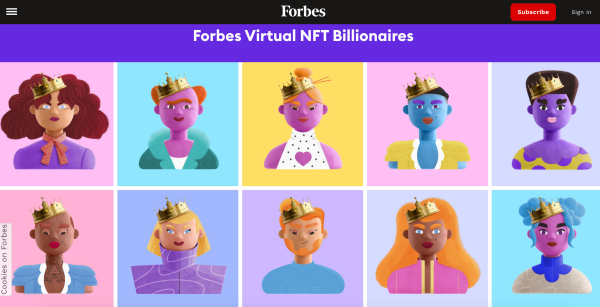
The collection, which opened for pre-sale in April 2022, consists of 100 "virtual billionaires", each with "an enormous theoretical portfolio and virtual net worth based on live New York Stock Exchange pricing".
Each billionaire, Forbes said, is minted with an imaginary portfolio drawn at random from actual stocks; a Forbes Virtual NFT Billionaires List will provide a daily ranking of how the fictional moguls' finances are faring.
Each billionaire cost 0.25 Ethereum, the approximate equivalent of $750 (£585). Forbes said all 100 billionaires in the first drop sold out in pre-sale, presumably netting the publisher approximately $75,000 (£58,500) before fees.
Forbes told Press Gazette the "billionaires" drop was neither for charity nor for driving revenue: "Instead, we are focused on engaging our audience and creating a unique experience for them."
CNN: >$329,700 (£253,000)
CNN’s NFT project, “Vault”, sells short video and image NFTs associated with the broadcaster’s coverage of historical events. Like Time, some of CNN’s NFTs are artworks informed by CNN coverage, but the most expensive items to sell through Vault - all of them sold out - have been $500 (£380) video clips of the moment CNN forecast various presidents’ election wins.
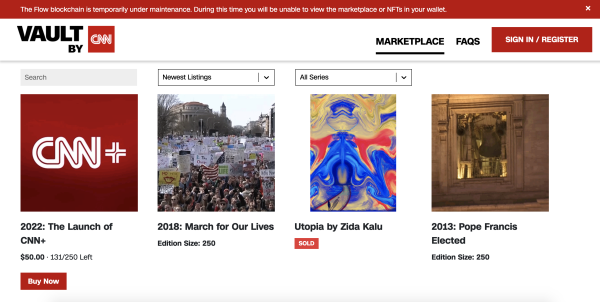
CNN's "Vault" NFT marketplace. Picture: a screenshot of Vault website
Asked how much money it had made from NFTs, a CNN spokesperson told Press Gazette: “We don’t comment on financials, but we are very pleased with the revenue we have generated.”
However, unlike most other news media NFT ventures on this list, the Vault website provides information about both sale price and how many editions were sold.
The 28 highest-priced NFT runs on the marketplace, all of them sold out, collectively earned CNN $323,750, before fees. The site hosts numerous other lower-priced or partially sold stocks. For example, at the time of writing, Vault had sold 119 of 225 NFTs it had been offering which depict the first moments of CNN’s new streaming service, CNN+. Each NFT cost $50.
Asked how exactly the financial set up works, CNN said: “Vault's platform partner Gig LabJus receives a portion of our proceeds. For pieces we release in collaboration with outside artists, we split those proceeds as well.”
The spokesperson said Vault continues to be CNN’s primary NFT initiative, “but we are exploring potential tie-ins with other CNN products in the future – any of which would be linked to the Vault ecosystem. We are looking forward to our continued growth, development and learnings.”
South China Morning Post: $130,000 (£100,000)
The South China Morning Post has gone a somewhat different route from the other publishers on this list by trying to create a new type of NFT altogether.
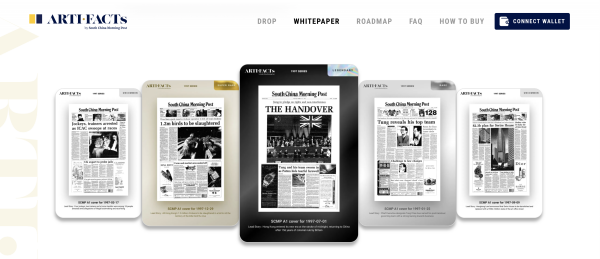
The South China Morning Post's website for its NFTs, named "Artifacts". Picture: SCMP screenshot
Whereas most publishers have levied their brand or photography archive to sell NFTs associated with pictures, Alibaba-owned SCMP claims to be selling “historical moments”.
The company says that it has established a new technical framework (“NFT standard”) to be able to do this.
On the website for its NFTs, which it calls Artifacts, SCMP says: “SCMP believes that factual accounts of history and authentic historical assets should be immutable, and that ownership of these digitised and tokenised assets (which are part of our collective human experience) should be decentralised.
“Our vision is that all ‘guardians of history’ will digitise and tokenise their assets as Artifacts.”
In practice however, like other publishers’ NFTs, Artifacts are associated with visual images - specifically, the front page of SCMP on a given date. In March, SCMP auctioned off its first round of these NFTs, all of them associated with events in the first half of 1997, the year Hong Kong joined the People’s Republic of China as a Special Administrative Region.
A “box” of five random Artifacts could be purchased for the equivalent of US$97 (£74), but had to be purchased using FUSD – a cryptocurrency on the Flow blockchain that is pegged to the value of the US dollar. All 1,309 boxes sold in two hours, presumably raising approximately £100,000 for SCMP.
SCMP chief executive Gary Liu, who describes himself in his bio on an SCMP Discord as an “Artifact evangelist”, told Press Gazette he was "very encouraged" by this first sale and said it "showed us that there is a marketplace for historical NFTs and there is a community of collectors who care about preserving historical assets with context on the blockchain".
Liu subsequently announced that Artifact would be spun off from SCMP as an independent venture, Artifact Labs, which he will lead once a replacement for him at the publisher has been found.
He told Press Gazette that Artifact Labs will help other publishers as well as bodies such as universities and cultural institutions to build their own NFT projects and business models.
Liu said the SCMP started studying blockchain and how blockchain could upend the media industry almost five years ago "but it wasn't until the NFT boom started at the beginning of 2021 that the SCMP found the application of blockchain technology which we believed could actually have a very real impact on our business, an immediate impact in our business.
"So our project really started about a year ago, when we realised that NFTs could help us actually monetise some of our most valuable assets that were otherwise hidden away in storage rooms and archives," he said.
Liu added: "NFTs specifically, I believe, will become very important for news publishers. Because it's the first time that the digital media that we create every day can have authenticated value.
"Today, the moment we publish a story or a picture or a video, even if it sits behind a paywall, it is only protected for a very short window of time. After that window of time, and for most news organisations in the world when they publish directly to a free site, almost immediately that digital media, that digital asset, can be replicated near infinitely, which means that the value of that asset gets driven down to zero very, very quickly. That's why we've had to completely change our businesses over the last 20 years."
Gannett*: At least $8,165 (£6,200); possibly upward of $183,165 (£140,000)
Gannett has carried out two NFT auctions. The first, an interactive mosaic sold in June 2021, raised $8,165 (£6,000) for charity. The second sold off 500 editions of an NFT associated with a painting by artist Peter Tunney at $250 a go; it also auctioned a paired painting-and-NFT work by the same artist starting at $50,000.
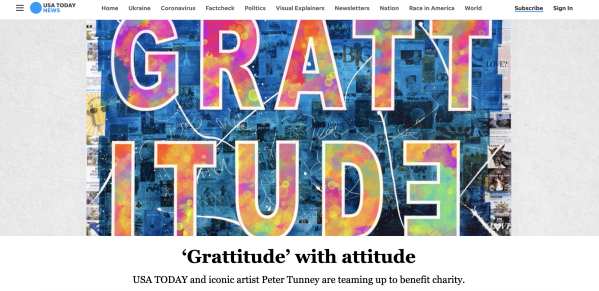
An article on the USA Today website promoting Gannett's second NFT auction. Picture: USA Today website
Gannett did not tell Press Gazette how much it had raised, but if the latter auction successfully sold all stock at the listed price it would have been at least $175,000. Proceeds were split between the Gannett Foundation, which the company says “supports community-building initiatives across the country”, and The Sunny Center, which helps people who are wrongfully convicted.
Gannett told Press Gazette in March: “We do not have any ongoing NFT projects currently nor do we have future plans at this time.”
Ukrainian media*: $3,499.65 (£2,660)
Three Ukrainian media outlets - Ukrainska Pravda, Novoye Vremya and NGO broadcaster Hromadske - partnered with NFT platform Vault (no relation to the CNN venture) in March for a fundraiser to sell NFT “keys” which would permit access to some exclusive content from the publishers.
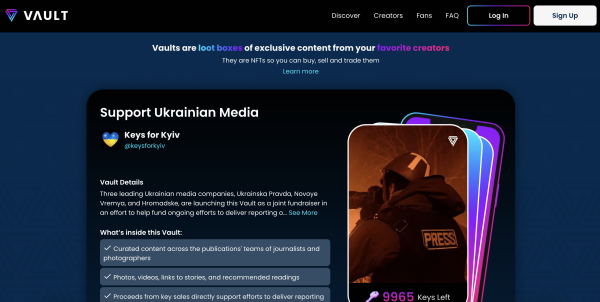
A screenshot of the "Keys for Kyiv" page on NFT platform Vault (not to be confused with CNN's own identically named NFT venture). Picture: Vault screenshot
Each key cost $99.99 (£75). At the time the key sales were launched Press Gazette reported: “If all the keys sell, the publications will raise $999,900 (£750,000) between them.”
However, as of early April only 35 keys had sold, accounting for sales of $3,499.65 (£2,660).
Quartz*: $1,800 (£1,375)
Quartz was one of the first news publishers to dabble in NFTs, selling a token of an article for $1,800 in March 2021, proceeds from which went to charity. The organisation has not tried to turn the experiment into an ongoing sideline, but has written about what the process of selling an NFT actually involves for a publisher.
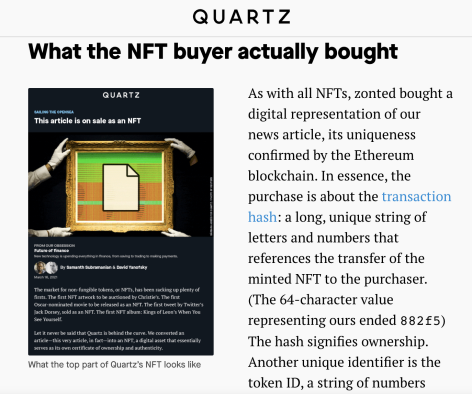
Quartz's article discussing its sale of its first NFT. Picture: screenshot of Quartz article, 'We sold the first-ever NFT news article for $1,800'
“It cost Quartz roughly $250 to conduct these transactions. This included a $200 ‘gas fee’ at the time of listing, paid to ‘mint’ the NFT on the blockchain, and a $50 fee to transfer the token’s ownership…
“Opensea took a 2.5% commission on the sale. Quartz will, additionally, earn 10% of any secondary sales conducted of its NFT.”
The Associated Press: unknown
The Associated Press launched its NFT bid at the end of January, intending to sell NFTs of its photojournalism. Sales did not continue for long, however: less than a month after the first sales, the agency drew criticism for a plan to sell an NFT video clip depicting “migrants drifting in an overcrowded boat in the Mediterranean”, per its official Twitter account.
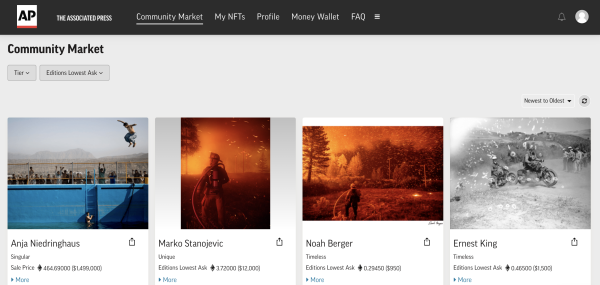
The Associated Press' NFT photography marketplace. Picture: Screenshot of ap.market.xooa.com
The sale was dropped after the outcry. The AP appears to have stopped its NFT work altogether days later: an administrator told users of its Discord channel on 1 March: “The team curating the NFT marketplace is pausing any new drops while we review our NFT photo selection process. We will let you know when drops resume.”
Asked by Press Gazette how much money the company had made through its NFT sales, an AP spokesperson said only: “AP’s NFT marketplace is a pilot program that we are reviewing. As a not-for-profit, AP’s mission is to inform the world with accurate, unbiased journalism. That remains our primary focus.”
Limited evidence remains online as to how much the company might have made from the tokens. The AP had said prices for its NFTs would vary, but a moderator told Discord users that each item in the first drop (i.e. opportunity to purchase) would cost $199 (£150) in Ethereum. When the project was in full swing, the AP told its Discord community that it intended to do three NFT drops a week, and that each drop would consist of 200 editions of an AP image.
It is unclear how many sold. Several Discord users posted about having successfully bought the tokens, and others about not being able to buy because of high demand. At the time of writing, there are 15 NFTs for sale on the AP’s NFT resale marketplace.
Since new drops paused over a month ago, members of the AP’s nascent NFT community have been left unsure where they stand.
One Discord user wrote: “Cmon, [administrator], give us some update. AP silence is confusing everyone here!”
Another asked: “So.... is this project dead now?”
Said a third: “If I was a[n NFT holder] expecting a secondary market, I would be feeling some pressure right now”.
An AP staff member wrote on the Discord on Tuesday to try to reassure community members.
“As you know, we've been reviewing everything from our drop details to the content we select and more. Rest assured, there is no rug pull!”
News UK: N/A
Contrary to reports in February that Sun and Times publisher News UK was looking at turning its front covers into NFTs, the company flatly denied the suggestion to Press Gazette: “We don't have anything to say on this just now. Not sure what prompted the Guardian interest.”
Picture: Reuters/Brendan McDermid
Email pged@pressgazette.co.uk to point out mistakes, provide story tips or send in a letter for publication on our "Letters Page" blog
